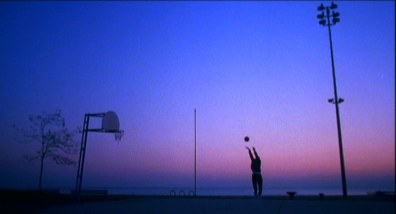Scoop's
notes
A man is serving jail time for the murder of his
wife when the warden summons him for some surprising news. Despite the serious nature of his crime, there could be a way for him to get out of prison early,
because he may be able to provide something that the governor wants. The prisoner's son
is the top prep school basketball player in the country, and the
governor is both a huge basketball fan and a loyal alumnus of Big
State University. The prisoner is given one week of supervised
release to persuade his son to attend Big State. That simple and
clear premise is the setting for a film that wanders off into some
complicated psychological territory because the prisoner will not have an
easy time persuading his son of anything. After all, he
killed the boy's mother!The prep star has
problems of his own even before the unsolicited and unwanted
appearance of his father. He
faces the temptations of pro contracts and easy money, as well
as all the pressures placed on him by having to choose from a
seemingly infinite number of colleges that want him to attend. He
also has to deal with scheming friends and relatives who see him as
a meal ticket. He Got Game is rich with details about the life of a
star high school athlete, and enhances the realism with cameo
appearances from dozens of real figures in the worlds of
professional and college sports, ranging from Shaq to several famous
college coaches to ESPN's Robin Roberts.
The film does not follow any of the sports movie
formulas. There is no convenient ending. There is no big game
to win at the end. In fact, there is no real competition shown at all,
except playground games and a climactic one-on-one between the
convict and his son. Although this film takes place in the context
of basketball, and was directed by Spike Lee, who is the Knicks' #1
fan and pal to many pro athletes, it's not really a film about
basketball at all, but rather about what sports can mean in the
lives of young men and their families, centering around the story of an estranged
father and son on a rocky path toward reconciliation. For both of these
extraordinary men, the dramatic conflict revolves around whether
they will learn to "do the right thing."
I think Spike made some mistakes here.
- Ray Allen, a real NBA stud and one of the
greatest pure shooters in history (check
out his free throw and 3-point shooting percentages), plays
the young basketball superstar, and is distractingly stiff in some
scenes. He probably should not have been asked to carry as much of
the film's dramatic baggage.
- The ending is inappropriately symbolic and
mystical after a film which has taken place in the real world. It's
sloppily sentimental as well.
- Parts of the story are just plain lacking in
credibility.
Set those criticisms aside. I don't want to dwell on the weaknesses of He Got
Game because it's a good film which develops both the father's and
the son's story in depth and with compassion. As a
heartfelt movie about reconciliation, growing up, fathers
and sons, and sports, He Got Game is kind of a contemporary
urban version of Field of Dreams. The story is
imbued with real passion for New York, and for basketball as a cultural
touchstone. It is also crafted with love for the medium of film itself. Spike Lee demonstrates
great mastery of film as an art form, and blends the elements of
color (see the captures below), composition, and music magnificently. In most films, musical
montages are gratuitous, but Spike uses them purposefully, to evoke
a specific mood and to provide additional meaning that would
otherwise take hundreds of words of voice-over.
Spike shares the honors with his ol' reliable stud
hoss of an actor, Denzel Washington. What a team they have been! Spike has been
known to
stray too far from realistic dialogue, and in the hands of
lesser actors that can cause a problem with the audience's
customary suspension of disbelief, but Denzel is a
writer's dream. No matter how bad a line of dialogue may be, Denzel
can come up with some way to deliver it so that it seems authentic.
If a line seems stilted or artificial, Denzel finds a way to hide it
in the character, with irony or posturing or something else that
seems genuine in the moment. The man has a gift.
Denzel and Spike? They got game.
When it comes to sports films, basketball is the
forgotten stepchild, perhaps because Spike seems to be the only
writer/director with a passion for the game. Among the basketball
films rated higher than six at IMDb (table below), He Got Game is
the best fictional story about the experience of black men playing
the urban game. The four highlighted in green below are
documentaries, and the four in red are essentially docudramas (my
decision to include Coach Carter is debatable). That leaves only two
films rated higher than He Got Game: Hoosiers, which is about white
Midwesterners; and Love and Basketball, which centers on women's
basketball.
|


